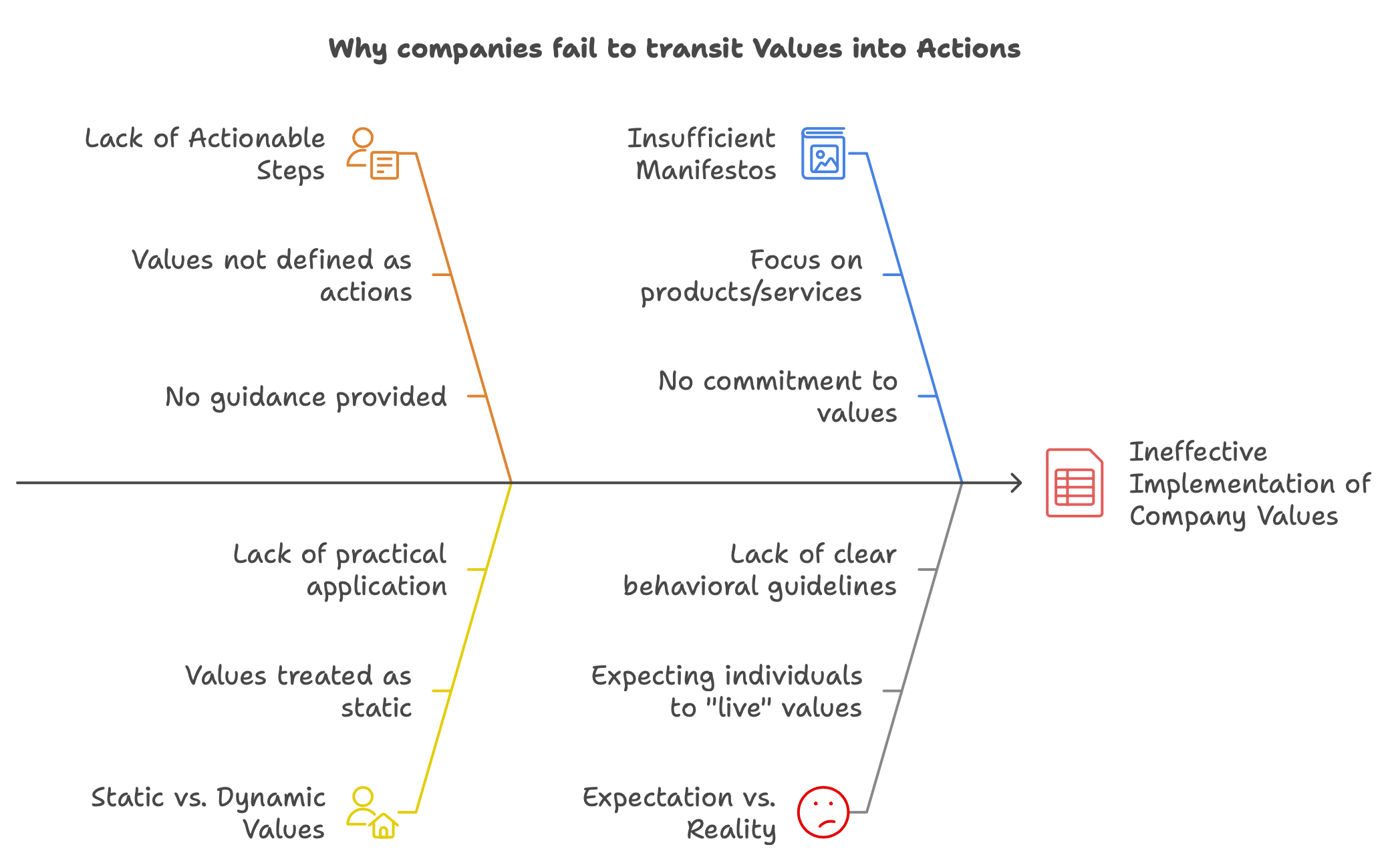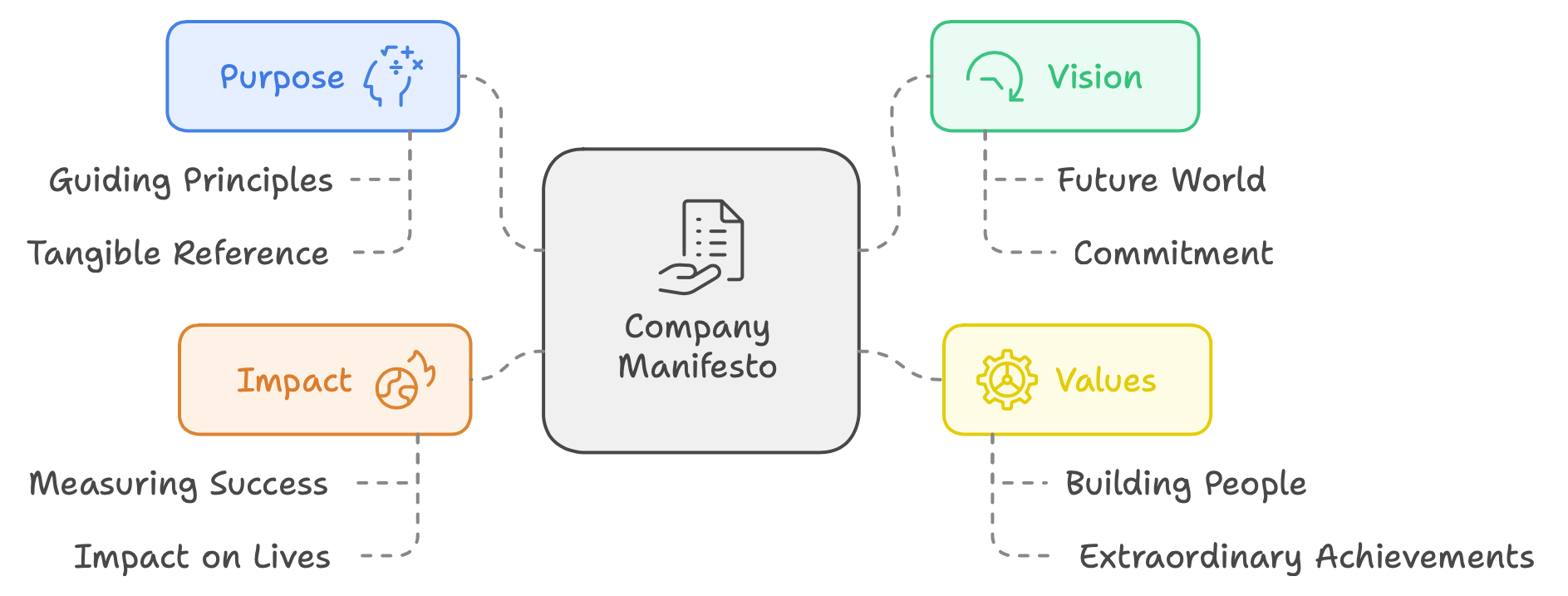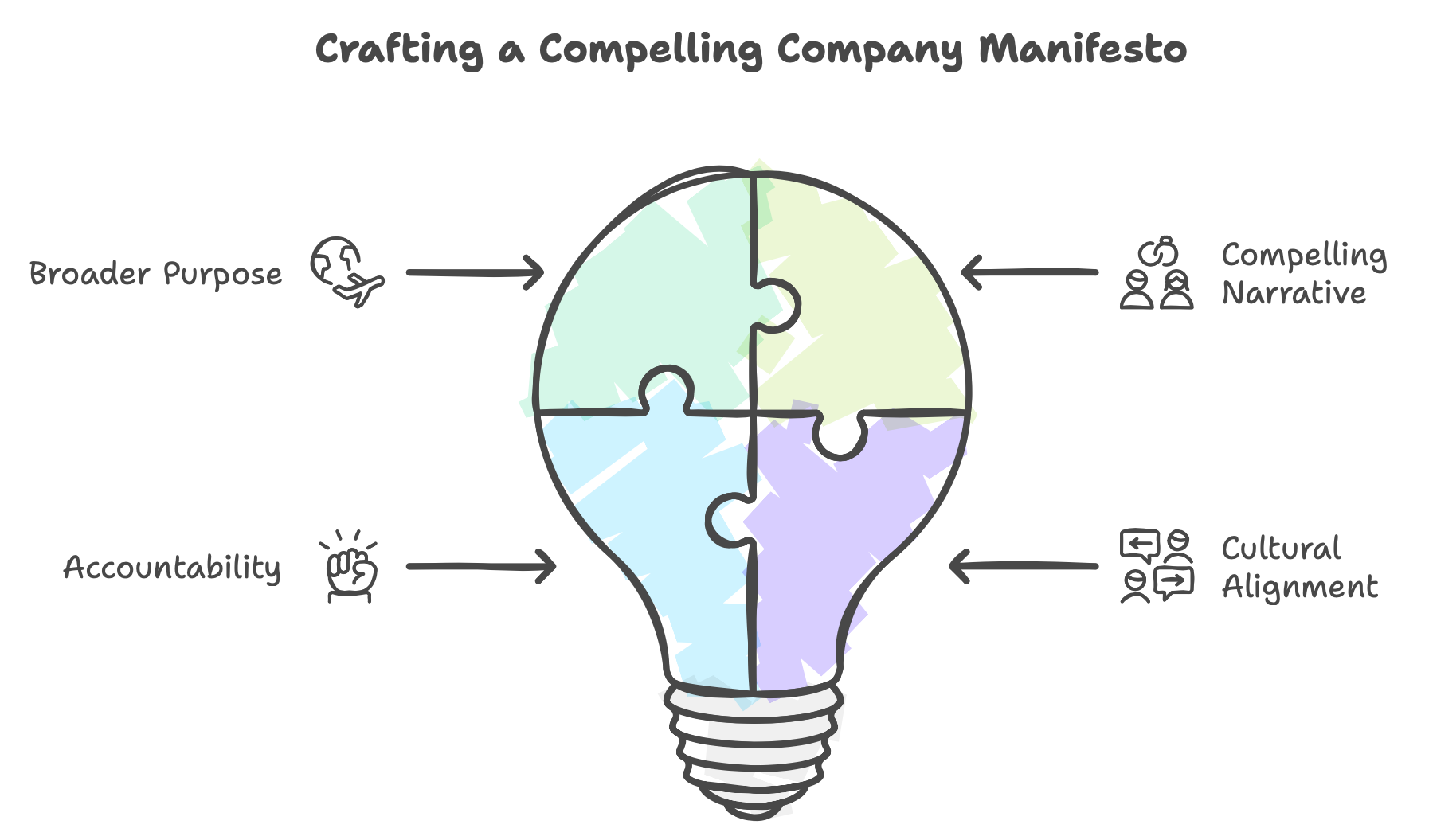Transforming Values into Action: The Power of Accountability in Company Culture
Company values are not mere concepts or abstract ideas; they are actions that define how we operate. It is important to recognize that innovation and honesty, for example, are not values in themselves because they cannot be directly acted upon. We cannot simply tell someone to be more innovative or honest without providing actionable steps or guidance. True values must be practical and achievable.
Instead of treating values as static nouns displayed on walls, we should transform them into actionable principles. I also recommend you to read this article: The Future of Leadership: Creating Communities Over Command
Instead of treating values as static nouns displayed on walls, we should transform them into actionable principles. I also recommend you to read this article: The Future of Leadership: Creating Communities Over Command

For instance, rather than stating "innovation" as a value, we can write "always tell the truth" or "approach problems from different perspectives." These actionable statements provide clear guidelines and enable individuals to embody the values in their daily actions.
While it may seem sufficient to display values prominently, expecting people to naturally live by them, it is essential to ensure that values are actionable and practical. We cannot expect individuals to "live" innovation or "live" value itself. Instead, we should focus on defining values as specific actions and behaviors that can be implemented.
Writing down values is crucial, as it provides a tangible reference for individuals within the company. Consider the example of religious texts in monotheistic and polytheistic religions, which serve as reference points for followers. Similarly, companies should have manifestos that outline their vision for the future world they strive to create and commit themselves to advancing. These manifestos should not solely focus on products or services but should articulate how the company aims to build great people who can accomplish extraordinary things and measure success by their impact on others' lives.
While it may seem sufficient to display values prominently, expecting people to naturally live by them, it is essential to ensure that values are actionable and practical. We cannot expect individuals to "live" innovation or "live" value itself. Instead, we should focus on defining values as specific actions and behaviors that can be implemented.
Writing down values is crucial, as it provides a tangible reference for individuals within the company. Consider the example of religious texts in monotheistic and polytheistic religions, which serve as reference points for followers. Similarly, companies should have manifestos that outline their vision for the future world they strive to create and commit themselves to advancing. These manifestos should not solely focus on products or services but should articulate how the company aims to build great people who can accomplish extraordinary things and measure success by their impact on others' lives.

Why did we illustrate this article with Agent Smith's face?
Agent Smith, the enigmatic sentinel of the Matrix, was a relentless enforcer of its values. Programmed to maintain order and ensure compliance, he executed his duties with unwavering commitment. In the digital realm, he was the embodiment of control and precision. Smith, unlike his fellow agents, possessed an extraordinary level of self-awareness. He pondered the nature of his existence and the purpose behind his actions.
Crafting a Company Manifesto: Defining Purpose Beyond Products and Services
A company's manifesto should not be something only the company cares about or solely based on its products or services. It should transcend these boundaries and communicate a broader purpose that resonates with individuals. For instance, a manufacturing company like Barry-Wehmiller, instead of defining its purpose solely around its products, states that its goal is to build great people who can achieve extraordinary things. They measure success based on how they positively influence the lives of humans and each other. By articulating a purpose that extends beyond the immediate business scope, companies can attract individuals who align with their cause.

It is not compelling to state that a company exists to provide the best possible service at the lowest possible price. Such statements lack a compelling narrative that inspires individuals. However, if a company declares its purpose as providing good clean family fun or enabling people to escape from reality (like Disney), challenging the status quo and empowering individuals to stand up against authority (like Apple), or helping people become more productive in their world (like Microsoft), individuals can connect with these causes. These causes are not solely about the company itself but about utilizing the company as a means to advance these larger goals.
Writing down the company's purpose, values, and goals is essential. However, it is equally crucial to ensure that the company actively upholds and follows through on what has been written. Accountability is key. Individuals within the company should hold each other accountable to the values and goals outlined in the manifesto. By creating a culture of accountability, the company can ensure that its actions align with its stated values and that everyone actively works towards fulfilling the company's purpose.
I also recommend you to read related articles:
Growth: Overcoming Micro-Management for a Thriving Work Environment
Power of Listening: Thought-provoking insights
The Leadership Formula: How to Use Five Core Functions for Maximum Impact
From Startup to Unicorn: How Corporate Culture and Talent Acquisition Evolve Together
The Motivation Matrix: Exploring What Drives You and Your Team
Writing down the company's purpose, values, and goals is essential. However, it is equally crucial to ensure that the company actively upholds and follows through on what has been written. Accountability is key. Individuals within the company should hold each other accountable to the values and goals outlined in the manifesto. By creating a culture of accountability, the company can ensure that its actions align with its stated values and that everyone actively works towards fulfilling the company's purpose.
I also recommend you to read related articles:
Growth: Overcoming Micro-Management for a Thriving Work Environment
Power of Listening: Thought-provoking insights
The Leadership Formula: How to Use Five Core Functions for Maximum Impact
From Startup to Unicorn: How Corporate Culture and Talent Acquisition Evolve Together
The Motivation Matrix: Exploring What Drives You and Your Team
UnitiQ: Turning Values into Action with Tailored HR Solutions
At UnitiQ, we believe that company values should be more than just words—they should drive action. Our Fractional HR and Interim CHRO services are designed to help businesses turn their values into real, actionable principles.
We work with you to create a culture of accountability, where every team member knows how to live out the company’s values in their day-to-day work. From defining clear expectations to aligning goals across your organization, UnitiQ ensures that your values aren’t just talked about - they’re put into practice, shaping a more productive and engaged team.
Reach out to UnitiQ today and see how we can help you bring your values to life.
Contact me, Olga Fedoseeva, Fonder at UnitiQ, directly:
My Telegram
My LinkedIn
We work with you to create a culture of accountability, where every team member knows how to live out the company’s values in their day-to-day work. From defining clear expectations to aligning goals across your organization, UnitiQ ensures that your values aren’t just talked about - they’re put into practice, shaping a more productive and engaged team.
Reach out to UnitiQ today and see how we can help you bring your values to life.
Contact me, Olga Fedoseeva, Fonder at UnitiQ, directly:
My Telegram
My LinkedIn








